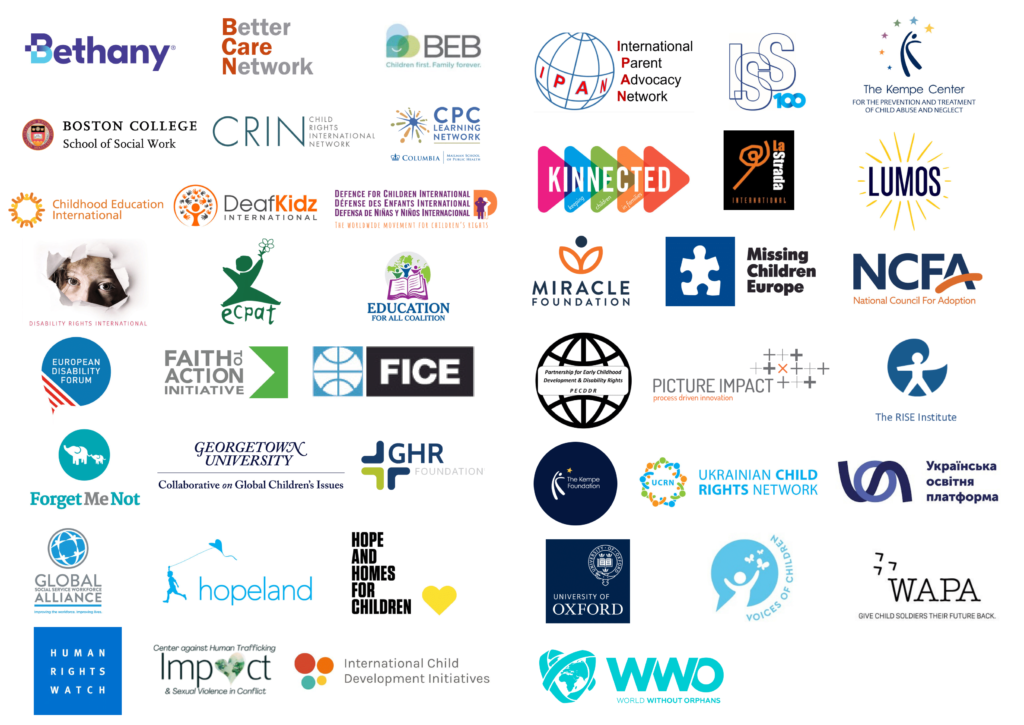According to reports by the Ukrainian authorities, the United Nations, the Russian government, and news media, these transfers have been ongoing since February 2022. While many of these children were living in Ukrainian institutions, most are not “orphans,” but have living birth parents or other relatives in Ukraine.
We are further concerned by reports that children from Ukraine are being transferred to “camps” and other facilities in Russia and Russia-occupied territories, which Russian officials have said provide “integration” and “patriotic education”. Children with disabilities have reportedly been transferred to psychiatric and other types of facilities allegedly for treatment. Many children have seen their date of return delayed, in some cases indefinitely, often with limited or no communication with their parents or information provided to parents by the authorities. This scheme places them at high risk of harm, loss of identity and culture, and long-term or permanent separation from their families.
The UN Office of the High Commissioner for Human Rights has underlined that “International humanitarian law prohibits forced transfers and deportation of protected persons, which may amount to war crimes. This prohibition also applies to children who are not nationals of the party to the conflict in which hands they are found.”
During emergencies, such as armed conflict, it is a well-accepted principle of States’ obligations under international law that adoption is not an appropriate response for unaccompanied and separated children. Until the fate of a child’s parents or other close relatives can be verified by the mandated authorities in Ukraine, each separated child should be considered as still having living relatives or legal guardians and, therefore, is not in need of adoption.
On July 1, 2022, global child rights organisations called for a moratorium on intercountry adoption of Ukrainian children, in line with the policy of the Ukrainian Government and international law. In January 2023, the UN High Commissioner for Refugees stated that Russia giving Ukrainian children Russian passports and putting them up for adoption “goes against the fundamental principles of child protection in situations of war.”
Every effort should be made to reunify children with their families. Children in emergencies should not be moved to another country to be placed in alternative care except for compelling health, medical or safety reasons. When a child must be moved, they should stay as close as possible to their home, be accompanied by a parent or caregiver, and have a clear plan of return home.
Any child displaced by the conflict in Ukraine must be cared for in line with these standards. This may include appropriate temporary family-based alternative care in the country or region of arrival, as long as this is accompanied by clear efforts to trace and reunify them with their own families and communities through cooperation with the Ukrainian authorities.
We condemn these practices and urge all parties to the conflict to respect international laws and standards that are there to protect children in conflict and other emergencies.
We call upon the Russian authorities, including Russia’s Presidential Commissioner for Children’s Rights, to immediately cease these practices. Urgent efforts must be made to ensure these children are reunited with their families and can be raised by their own relatives in their own culture and communities, speaking their own language.
The Commissioner for Children’s Rights and relevant Russian authorities should support tracing and reunification efforts for these children and any others displaced or evacuated to the Russian Federation in cooperation with the Ukrainian authorities, international agencies including UNICEF and the UN Refugee Agency (UNHCR), and other relevant regional and national organisations.
We also call for a robust and rapid response from the international community to help ensure these children’s protection, including:
Further recommendations and guidance on children’s care in the conflict in Ukraine can be found here.
As of 8 March 2023, this joint statement has been endorsed by the following 43 organisations, agencies, and networks: Bethany Christian Services, Better Care Network, Boston College School of Social Work, Both Ends Believing, CPC Learning Network at Columbia University, Childhood Education International, Child Rights International Network, Deaf Kidz International, Defence For Children International, Disability Rights International, ECPAT International, Education For All Coalition, European Disability Forum, Faith to Action Initiative, FICE International, Forget Me Not, Georgetown University Collaborative on Global Children’s Issues, GHR Foundation, Global Social Service Workforce Alliance, Hope and Homes for Children, Hopeland, Human Rights Watch, IMPACT: Center Against Human Trafficking and Sexual Violence in Conflict, International Child Development Initiatives (ICDI), International Parent Advocacy Network, International Social Services (ISS), Kempe Center on the Prevention and Treatment of Child Abuse and Neglect, Kinnected, La Strada International, Lumos, Miracle Foundation, Missing Children Europe, National Council For Adoption, Partnership for Early Childhood Development & Disability Rights (PECDDR), Picture Impact, RISE Institute, The Kempe Foundation, Ukrainian Child Rights Network, Ukrainian Education Platform, University of Oxford Dept of Social Policy and Intervention, Voices of Children, WAPA International, and World Without Orphans

For more information, please contact; communications@ecpat.org